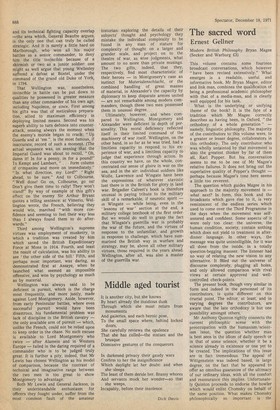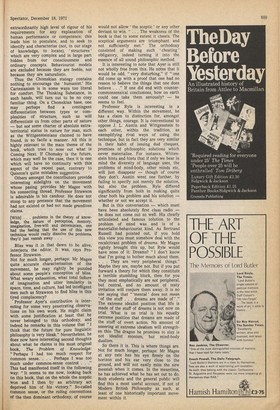The sacred word
Ernest Gellner
Modern British Philosophy Bryan Magee (Secker and Warburg £3) This volume contains some fourteen broadcast conversations, which however "have been revised extensively." What emerges is a readable, useful and informative book. Mr Bryan Magee, editor and link man, combines the qualification of being a professional academic philosopher with that of a media-man, and is clearly well equipped for his task.
What is the underlying or unifying theme of the book? It is the fate of a tradition which Mr Magee correctly describes as having been, in Oxford, "the orthodoxy of a whole generation" — namely, 'linguistic philosophy. The majority of the contributors to this volume were, to a greater or lesser degree, collaborators in this orthodoxy. The only contributor who was wholly untainted by that movement is also the greatest thinker by far of them all, Karl Popper. But his conversation seems to me to be one of Mr Magee's relative failures. It does not bring out the superlative quality of Popper's thought — perhaps because Magee's tone here seems a little too reverent.
The question which guides Magee in his approach to the majority movement is — what next? In form, this book and the broadcasts which gave rise to it, is very reminiscent of the endless series which used to come over the Third Programme in the days when the movement was selfassured and confident. Some aspects of it were only too clear: the universe, the human condition, society, contain nothing which does not yield to treatment in afterdinner language. In other ways, the message was quite unintelligible, for it was all done from the inside, in a totally question-begging manner. The listener had no way of relating the new vision to any alternative. It filled out the universe of discourse completely, plugging all holes, and only allowed comparison with rival views at certain approved and wellcontrolled check-points. The present book, though very similar in form and indeed in the personnel of its contributors, is quite different on this crucial point. The editor, at least, and in varying degrees the contributors, are aware that the late orthodoxy is but one possibility amongst others.
Mr. Anthony Quinton rightly connects the current philosophic scene with the preoccupation with the humanism/scient ism issue, the question whether man is best seen in the idiom of daily speech or in that of some science, whether it be a science already in existence or one yet to be created. The implications of this issue are in fact tremendous. The appeal of Wittgenstein was indeed based, in large degree, on the fact that he appeared to offer an omnibus guarantee of the ultimacy of our ordinary ideas, with all the comfort and reassurance this implies. Unfortunately Quinton proceeds to endorse the howler which would enlist Chomsky on behalf of the same position. What makes Chomsky philosophically so important is the extraordinarily high level of rigour of his requirements for any explanation of human performance or competence; this leads him to postulate, and to seek to identify and characterise (not, in our stage of knowledge, to locate), ' structures ' which are very complex and in large part hidden from our consciousness and ordinary concepts. Behaviourist models are excluded because they are feeble, not because they are naturalistic.
Thus the Chomskian stategy contains nothing to encourage the ' humanist.' His Cartesianism is in some ways too literal for comfort. The Thinking Substance, in such hands, will turn out to be no cosy familiar thing. On a Chomskian base, one may perhaps find a contingent differentiation between types or complexities of structure, such as will differentiate us from other parts of nature — but not some charter of absolute extraterritorial status in nature for man, such as the Wittgensteinians claimed to have found, in so facile a manner. All this is highly relevant to the main theme of the book, which tries to nose out what is Coming Next. If Chomsky is the future, which may well be the case, then it is one which will have no continuity with this aspect of the recent past, contrary to Quinton's quite mistaken suggestion.
Others amongst the contributors provide interesting sidelights on the movement whose pasing provides Mr Magee with his connecting thread. Professor Strawson is admirable in his candour. He does not stoop to any pretence that the movement had not existed or had not made grandiose olaims.
[With] . . . problems in the theory of knowledge, the nature of perception, memory, imagination, free-will and determinism, one had the feeling that the use of this new technique would really dissolve the problems, they'd just vanish away . . .
Bliss was it in that dawn to be alive, interjects the editor. It was, cays Professor Strawson.
Not for much longer, perhaps: Mr Magee quite accurate characterisation of the movement, he may rightly be puzzled about some people's conception of bliss. What weary exhaustion, what total failure of imagination and utter insularity in space, time, and culture, had led intelligent men such as Strawson to find bliss in this tired complacency? Professor Ayer's contribution is interesting for some very penetrating observations on his own work. He might claim with some justification at least that he never belonged to this orthodoxy, and indeed he remarks in this volume that "I think that the future for pure linguistic philosophy is very bleak." Nevertheless, he does now have interesting second thoughts about what he claims is his most original book, The Problem of Knowledge: "Perhaps I had too much respect for common sense. . . . Perhaps I was too Much under common-sense control . . This had manifested itself in the following way: "It seems to me now, looking back on this book, that on the whole the sceptic Won and I then by an arbitrary act deprived him of his victory." So-called common sense, or the ruling conventions of the then dominant orthodoxy, of course would not allow 'the sceptic' or any other deviant to win. " . . . The weakness of the book is that to some extent it cheats. The sceptical arguments are triumphant and not sufficiently met." The orthodoxy consisted of making such 'cheating ' obligatory, indeed turning it into the essence of all sound philosophic method.
It is interesting to note that Ayer is still not wholly free from this. He notes that it would be odd, "very disturbing," if "one did come up with a proof that one had no reason to believe the things that one does believe . ." If one did end with countercommonsensical conclusions, how on earth could one take them seriously? — he seems to feel.
Professor Ryle is interesting in a different way. Within the movement, he has a claim to distinction for, amongst other things, courage. It is conventional to oppose J. L. Austin and Wittgenstein to each other, within the tradition, as exemplifying rival ways of using the technique, but in fact they are very similar in their habit of issuing dud cheques, promises of philosophic solutions which never materialise. For instance, Wittenstein hints and hints that if only we bear in mind the diversity of language uses, the problems of mind-body, other minds etc, will just disappear — though of course they don't. Austin went one further, by failing to specify not merely the solution, but also the problem. Ryle differed significantly from both in making quite clear both his problem and his solution — whether or not we accept it.
But in this conversation — which must have been absolutely first class radio — he does not come out so well. His clearly articulated and famous solution to the problem of mind was and is of a materialist-behaviourist kind. As Bertrand Russell had pointed out, if you hold this view you must somehow deal with the recalcitrant problem of dreams. Mr Magee rightly brought this up, but Ryle would have none of it: Dreams? "I don't know that I'm going to bother much about them. . • • They are very peripheral things." Maybe they are, maybe not. But if you put forward a theory for which they constitute a terrible stumbling block, then for you they most emphatically are not peripheral, but central, and no amount of testy irritation will conjure them away. It is no use saying that " 'mental ' does not mean of the stuff . . . dreams are made of' ." The extreme idealist position that life is made of the stuff of dreams is not now on trial. What is on trial is his equally extreme position that dreams are made of the stuff of overt action. No amount of sneering at extreme idealism will strengthen this. The dragon he promises to slay is not idealist monism, but mind-body dualism.
So there it is. This is where things are. Not for much longer, perhaps: Mr Magee at any rate has his eye firmly on the horizon and his ear very close to the ground, and will not easily miss the new messiah when it comes. In the meantime, he has achieved what he has set out to do. Both students and the general public will find this a most useful account, if not of Modern British Philosophy as such, at least of one historically important movement within it.











































 Previous page
Previous page